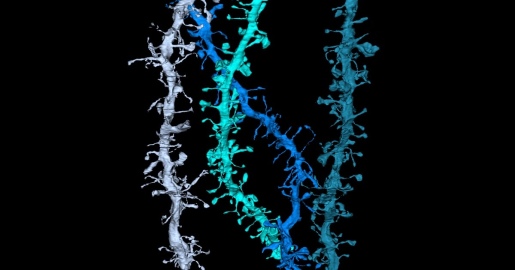NIH: People spend about a third of their lives asleep. When we get too
little shut-eye, it takes a toll on attention, learning and memory, not
to mention our physical health. Virtually all animals with complex
brains seem to have this same need for sleep. But exactly what is it
about sleep that’s so essential? Two NIH-funded studies in mice now offer a possible answer. The two
research teams used entirely different approaches to reach the same
conclusion: the brain’s neural connections grow stronger during waking
hours, but scale back during snooze time. This sleep-related phenomenon
apparently keeps neural circuits from overloading, ensuring that mice
(and, quite likely humans) awaken with brains that are refreshed and
ready to tackle new challenges.
The idea that sleep is required to keep
the brain wiring sharp goes back more than a decade [1]. While a fair
amount of evidence has emerged to support the hypothesis, its
originators Chiara Cirelli and Giulio Tononi of the University of
Wisconsin-Madison, set out in their new study to provide some of the
first direct visual proof that it’s indeed the case.
As published in the journal Science, the researchers used a
painstaking, cutting-edge imaging technique to capture high-resolution
pictures of two areas of the mouse’s cerebral cortex, a part of the
brain that coordinates incoming sensory and motor information [2]. The
technique, called serial scanning 3D electron microscopy, involves
repeated scanning of small slices of the brain to produce many thousands
of images, allowing the researchers to produce detailed 3D
reconstructions of individual neurons.
Their goal was to measure the size of the synapses, where the ends of
two neurons connect. Synapses are critical for one neuron to pass
signals on to the next, and the strength of those neural connections
corresponds to their size.
The researchers measured close to 7,000 synapses in all. Their images
show that synapses grew stronger and larger as these nocturnal mice
scurried about at night. Then, after 6 to 8 hours of sleep during the
day, those synapses shrank by about 18 percent as the brain reset for
another night of activity. Importantly, the effects of sleep held when
the researchers switched the mice’s schedule, keeping them up and
engaged with toys and other objects during the day.
In the second Science report, Richard Huganir and his
colleagues at Johns Hopkins University School of Medicine, Baltimore,
measured changes in the levels of certain brain proteins with sleep to
offer biochemical evidence for this weakening of synapses [3]. Their
findings show that levels of protein receptors found on the receiving
ends of synapses dropped by 20 percent while their mice slept.
The researchers also show that the protein Homer1a—important in
regulating sleep and wakefulness—rises in synapses during a long snooze,
playing a critical role in the resetting process. When the protein was
lacking, brains didn’t reset properly during sleep. This suggests that
Homer1a responds to chemical cues in the brain that signal the need to
sleep.
These studies add to prior work that
suggests another function of sleep is to allow glial lymphatics in the
brain to clear out proteins and other toxins that have deposited during
the day. All of this goes to show that a good night’s sleep really can
bring clarity. So, the next time you’re struggling to make a decision
and someone tells you to “sleep on it”—that might be really good advice.
References:
[1] Sleep and synaptic homeostasis: a hypothesis. Tononi G, Cirelli C. Brain Res Bull. 2003 Dec 15;62(2):143-150.
[2] Ultrastructural evidence for synaptic scaling across the wake/sleep cycle. de Vivo L, Bellesi M, Marshall W, Bushong EA, Ellisman MH, Tononi G, Cirelli C. Science. 2017 Feb 3;355(6324):507-510.
[3] Homer1a drives homeostatic scaling-down of excitatory synapses during sleep. Diering GH, Nirujogi RS, Roth RH, Worley PF, Pandey A, Huganir RL. Science. 2017 Feb 3;355(6324):511-515.
Links:
Sleep and Memory (National Institute of Mental Health/NIH)
Why is Sleep Important? (National Heart, Lung, and Blood Institute/NIH)
Huganir Lab (Johns Hopkins, Baltimore)
Chiara Cirelli (University of Wisconsin, Madison)
Giulio Tononi (University of Wisconsin, Madison)
NIH Support: National Institute of Mental Health, National
Institute of Neurological Disorders and Stroke; National Institute of
General Medical Sciences
